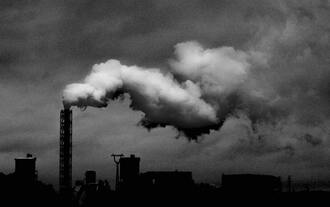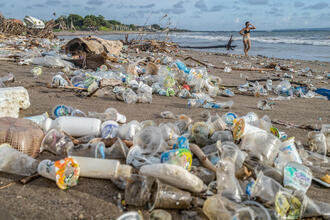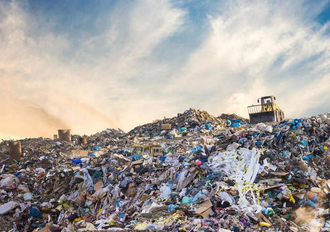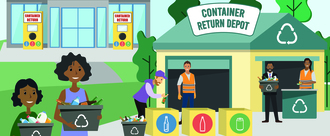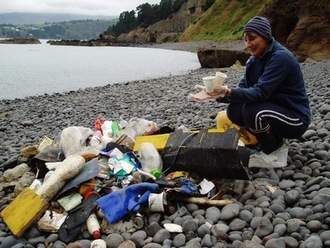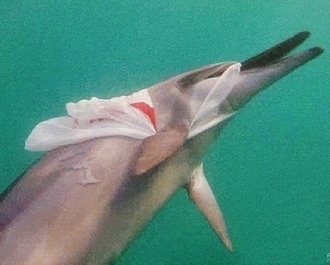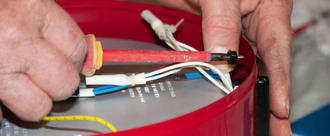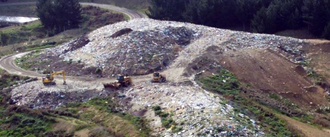-
Oppose the Waste-to-Energy incinerator in the Waimate District'Project Kea' is a Waste-to-Energy project that would incinerate large volumes of waste. If constructed the plant would truck in 365,000 tonnes of waste annually to burn and generate modest amounts of electricity. Waste-to-energy plants release dangerous chemicals and carbon dioxide into the atmosphere. 'Project Kea would produce the equivalent CO2 emissions to an extra 100,000 cars on the road each year. Toxins that come out of the incinerator include dioxins, heavy metals, and particulates, which all pose a serious risk to human health. 🔥 Waste-to-Energy plants use vast amounts of resources to operate. 'Project Kea' would use 2.5 million litres of fresh water each day, 365 days a year, and burn in excess of 100,000 litres of diesel each year. Waste-to-Energy does not remove the need for landfills, as it requires the landfilling of 100,000 tonnes of toxic ash annually. Beyond that, the plant will build in the need to find and supply more waste to feed the beast. Constant demand incentivises the creation of more waste and discourages zero-waste efforts. This moves us away from a more circular economy, acting within the limits of the natural environment. Waste-to-Energy is an outdated waste disposal method that European countries are moving away from. The Waimate plant would be the first ever built in Aotearoa, but it could pave the way for more. South Island Resource Recovery Limited's (SIRRL) proposal to build 'Project Kea' was to be decided in the Environment Court. However, the Government has included the proposal in its list of 149 projects for fast-tracking, removing it from the Environment Court and taking with it community input. 💚 This petition demonstrates our local support for our elected representatives to oppose 'Project Kea. If you oppose false solutions such as Waste-to-Energy, and want a more circular economy, please sign! Find out more about the problems with waste-to-energy: https://zerowaste.co.nz/waste-to-energy-incineration/3,195 of 4,000 SignaturesCreated by Robert Ireland

-
Petition: Support a strong Global Plastics Treaty!We all deserve a world free of plastic pollution. The oil industry and big corporations like Coca-Cola create tons of plastic pollution. It is now found in the deepest oceans and on the highest mountains. It’s harming wildlife like turtles and seabirds, and affecting human health. Plastic is full of toxic chemicals, and it is everywhere. It is poisoning our health, harming communities, and destroying our environment and wildlife. Microplastics are in our bodies, from the food we eat, the water we drink, and even the air we breathe. And because over 99% of plastic is made from fossil fuels, and we keep making more, it is a significant driver of the climate crisis. But change is coming. In March 2022, governments officially adopted a mandate opening negotiations for a global, legally binding Plastics Treaty to address the whole lifecycle of plastics. The fifth and supposedly final round of UN treaty negotiations happened in Busan, South Korea, in November 2024, but world governments did not finalise an agreement. Instead, more than 100 countries courageously stood up against the fossil fuel industry for a strong treaty that cuts plastic production — extending negotiations into 2025! This means we have another round of negotiations to fight, and momentum is on our side! The future treaty has a huge potential to put the world on a path towards a plastic-free future, but it will be up to us to make sure that it delivers on its promises. We demand an ambitious Global Plastics Treaty that will cut plastic production and use. A strong Global Plastics Treaty will keep oil and gas used to produce plastic in the ground and stop big polluters in their relentless plastic production. A legally binding plastics treaty will deliver a cleaner, safer planet for us and for future generations. Tell The NZ Government to champion a strong Global Plastics Treaty during upcoming negotiations so that we can finally turn off the tap and end the age of plastic.60,676 of 75,000 SignaturesCreated by Greenpeace Aotearoa

-
Slow down fast fashion!There are too many clothes in the world! Fast fashion is pumping out huge amounts of cheap synthetic garments that end up in landfills. 🧵 We need to regulate the industry and slow down the giant Corporate overproduction of fast fashion. Fast fashion has created underpriced disposable clothing, and is enabling environmental destruction. Fast fashion is driven by capitalism and corporate profit, which is driving the world’s biggest problems such as the climate, biodiversity and humanitarian crises. The fashion industry is responsible for 10% of global greenhouse gas emissions 🧵 Fast fashion is second to Oil in its damage to our environment. Oil is currently involved in every part of the production and delivery process of fast fashion, including the creation of the materials (such as polyester and nylon). It walks hand in hand in domination and pollution. Ghana’s desert and other places around the world have become dumping grounds for the worlds throw-away clothes. Microplastics are pouring into our oceans everyday from simply washing our clothes that are made out of plastic. Fast fashion depends on modern slavery. 1 in every 130 women and girls around the world fall victim to modern slavery, and many work in sweatshops in Asia, creating garments for fast fashion brands. 🧵 It doesn’t have to be this way. It’s time for big change. It’s time to honour our environment and our planet and people. We need to prioritise circular design and production systems. We need businesses that honour our environment and life on earth, the natural laws that we operate inside of. We need policies from Government that will control and regulate the industry and put the responsibility back on corporations. The Giants must be stopped. By regulating to slow down fast fashion we can use and appreciate what we have. We can support our local clothes designers and makers. 🧵 Join the rebellion! Sign the petition and demand an end to our part in the harms of fast fashion. 🪡 Links • NZ landfill boss sees alarming rise in clothing waste, 1 News • Steven Junil: 'If NZ stopped importing fabric and clothing, we’d be fine for another 50 to 100 years', RNZ • Recommendations to the New Zealand Government from the Clothing & Textile Industry, 2021 https://www.youtube.com/watch?v=VC5KYX74AP4 Ghana: fast fashion's dumping ground3,290 of 4,000 SignaturesCreated by Lucy-Mae Goffe-Robertson
-
Make a submission to support a beverage Container Return Scheme for AotearoaAfter years of campaigning from community groups, waste minimisation experts and with support from local government and the Environment Select Committee, the Kiwi Bottle Drive and allied organisations Zero Waste Network, Para Kore, Greenpeace, the Rubbish Trip and the New Zealand Product Stewardship Council are delighted with the government’s proposal to finally implement a Container Return Scheme in Aotearoa New Zealand! The proposal currently out for public consultation includes most of the key points we have been advocating for, such as a 20c deposit, the inclusion of all materials, and convenient and accessible collection points. There is room for improvement in a few areas: to keep things simple and fair, milk and refillables should be included in the scheme and more power must be given to community and social enterprises, with particular regard for Māori-led initiatives, rather than handing the Container Return Scheme to industry to lead. We have the chance now to make a few tweaks and develop the best Container Return Scheme for Aotearoa: a simple, comprehensive Tiriti-led scheme that will increase the circularity of beverage containers, ensure producer responsibility and deliver maximum benefits to the community. Add your voice to the group submission now! *If you prefer, you can make a submission directly through the government website, where you can also read more about the proposals: https://environment.govt.nz/what-government-is-doing/areas-of-work/waste/container-return-scheme-reducing-waste-landfill/4,015 of 5,000 SignaturesCreated by Kiwi Bottle Drive
-
Make Otautahi-Christchurch one-use plastic-bag freeSamoa and 29 other countries have banned them...now it's time for our redesigned city Otautahi-Christchurch to lead the way in NZ. New Zealanders send an estimated one BILLION plastic bags to landfill annually. Scientists estimate it takes 1000 years (yes, you read that right) for plastic bags to degrade and during that process toxins are leached and particles can get into the food chain.2,135 of 3,000 SignaturesCreated by Megan Blakie

-
New Countdown, No PlasticSingle-use disposable plastic bags are not recycled and although often reused, they pollute and poison the marine and land environment and negatively impact human and animal health. The ingestion of plastic in the Hauraki Gulf and beyond seriously threatens turtles, whales, sea birds and myriad other creatures. Plastic bags take several hundred years to break down leaving microscopic pieces of highly toxic plastic in the environment as they fissure. Toxicity from plastic components has been scientifically linked to metabolic disorders and threats to fertility in humans and sea creatures. Stopping the use of single-use disposable plastic bags is a relatively easy way we can make a positive difference.1,035 of 2,000 SignaturesCreated by Jennifer Fountain

-
Make it our Right to RepairAre you frustrated that products aren’t made to last and when they break, they are not repairable? You are not alone! A 2020/2021 Consumer NZ survey of 5000 New Zealanders found that 76% of participants would rather get products repaired than throw them out and buy a new one By reducing product quality, and making products hard to repair, companies can sell stuff more cheaply. This fuels trends like ‘fast fashion, ‘fast furniture’ and ‘fast electronics’. As a result, our landfills are filling up, our climate is heating up, and every day we are wasting money replacing broken items that should be lasting far longer. Recycling alone isn’t enough to reduce the mountain of discarded stuff that ends up clogging our landfills. It doesn’t have to be this way! In the past, stuff was built to last, and there were skilled people throughout Aotearoa New Zealand who could repair your appliances, computer or furniture for a fraction of the cost of replacing them. Join us in calling on the Minister for the Environment to consider the following measures to make it easier and cheaper for people to get items repaired in Aotearoa New Zealand, and to turn the tide on the waste we create: 1. Pass laws that require products to last longer and be easier to repair Aotearoa New Zealand is behind many countries in the world when it comes to protecting the Right-to-Repair in law. We call on the Government to look to the best overseas examples of Right-to-Repair laws and pass our own laws in a short space of time, to ensure that products put on the market in New Zealand meet basic standards of durability and repairability. Laws need to ensure that spare parts are made available, and that independent repairers have access to the tools and information they need to fix broken items. Achieving good outcomes for repair requires changes to education, to consumer law, copyright law and waste minimisation law. We ask that the Government also promote circular product design and repair across the education sector, to ensure students are learning skills and mindsets to create sustainable technologies. 2. Take action to make repair services accessible and affordable for everyone We call on both central and local government to ensure equitable access and availability of repair services in communities across Aotearoa. In particular, actively supporting the growth of both for-profit and community-based repair services, and introducing reliable funding mechanisms for these businesses and organisations. Good tools for this job could include: targeted waste levy funding, subsidies for repair, providing free or low-cost physical spaces in cities and towns for repair hubs, and making sure that product stewardship schemes cover the costs of repair, as well as recycling. 3. Ensure consumers have access to information on product repairability and durability When purchasing products in Aotearoa, it can be difficult to tell whether a product is good quality or easily repairable, due to a lack of information. We call on the Government to support Consumer NZ in developing a labelling or certification scheme to be displayed on key products, such as electronics, furniture and textiles, so consumers know how long a particular product is expected to last. We would like to see Aotearoa adopt a ‘repairability index” (similar to the French one) so that people can see how easy it is to get an item repaired before they buy it. 4. Require producers to offer spare parts and repair services Under the Consumer Guarantees Act manufacturers need to provide spare parts and access to repair services for their products. However, if they let the consumer know at the point of sale that there are no spare parts or repair services then they can opt out of this provision. We urge you to amend the Consumer Guarantees Act so that no manufacturer can opt out of this. It's time to reclaim our right to buy durable products that are easy to repair. We want Government to hold producers and retailers responsible for the whole life-cycle costs of the products they put into the market.14,107 of 15,000 SignaturesCreated by Repair Café Aotearoa New Zealand
-
Protect our environment and community and close the Levin landfill in 2022While the Horowhenua District Council (HDC) has recently closed the landfill for six months to enable community consultation and address long-standing compliance issues, our campaign is far from over. The Council still has resource consent to operate on the site until 2037. While the landfill is temporarily closed our waste is being sent to Bonny Glen – a compliant landfill near Marton. We want to keep it that way! You can help by signing our petition to protect the Hōkio environment from harmful waste leaching from the Levin landfill. Your support will help us close this non-compliant landfill and repatriate the site which has been degrading the Hōkio environment for decades; leaching into groundwater, polluting the Hōkio stream, and the ocean. In a time of climate change - when communities are cleaning up rivers, lakes, waterways and toxic sites all over Aotearoa – the Hōkio environment deserves a reprieve. We’re Over It because we strongly support the concerns of local Māori who have been ignored and disrespected over the on-going abuse of their rohe for years. We’re Over It - because the Hōkio community is frequently subject to foul odours - with residents’ complaints to the Horizons Regional Council (HRC) not being taken seriously. We’re Over It because the Horizons Regional Council is not being ‘called out’ over its shoddy environmental monitoring of the landfill and the Horowhenua catchment. We’re Over It because the landfill is consistently in breach of a number of ‘resource consents’ to operate in an environmentally responsible manner. We’re Over It because the District Council is not transparent with ratepayers on how the landfill is run. Contrary to popular myth, this facility is running up debt, not making money for the district. Why should you care? Well, if you’re a Kāpiti or Horowhenua resident - it’s your rubbish so you need to know where it’s going and that it’s not damaging the environment. Even if it’s not your rubbish, you should be concerned that in the 21st century any New Zealand community is operating a landfill like this, on a flood plain in coastal sand dune country.422 of 500 SignaturesCreated by Allison Webber
-
We want a comprehensive bottle refund scheme for AotearoaAfter years of campaigning from community groups, waste minimisation experts and councils and with the backing of the Environment Select Committee, we are the closest we have ever been to having a Container Return Scheme (CRS) implemented in NZ! This scheme will have enormous benefits for our community, land and sea; higher recycling rates, more reuse, decrease in litter and green jobs for local people. But we need it to be done right. Right now, vested industry groups are trying to block a comprehensive CRS in New Zealand and have their products (such as glass) excluded. Read more about our campaign on the Kiwi Bottle Drive website and check out the longer version of our open letter cosigned with other zero waste groups and like-minded organisations.4,914 of 5,000 SignaturesCreated by Kiwi Bottle Drive
-
#TakeawayThrowaways for food and drink: End single-use, return to reuseAotearoa New Zealand has a waste problem that we can’t recycle our way out of. Single-use disposable serviceware belongs to the outdated ‘take-make-dispose’ linear economy, which accelerates our global and local waste crisis, fills up our landfills to produce methane and toxic leachate, and increases litter pollution. Extracting natural resources to make endless streams of single-use items is also unsustainable in the face of resource depletion and climate change, which threaten the planet’s mauri (life-force) and our mauri as descendants of the planet. We need visionary personal, business and policy solutions that prevent and reduce waste in the first place, and that replace throwaways with non-toxic reusable alternatives that work for all people. These upstream solutions will create less waste and fewer greenhouse gas emissions than recycling, composting or landfilling. Transitioning to a circular economy won’t be easy; it makes sense to start with low-hanging fruit. While some single-use items remain unavoidable for some applications (such as certain medical contexts, accessibility needs or civil emergencies), most single-use disposable serviceware for food and drink is relatively easy to prevent if we choose to reuse. Many individuals, businesses and communities in Aotearoa New Zealand are already embracing reusables. We can take this further and mainstream reuse with Government policy that removes throwaway options and replaces them with scaleable and accessible reusable alternatives. We recognise that single-use disposable serviceware often has accessibility-friendly characteristics that enable the independence of people with access needs, including the disabled community, the elderly and young children. Reusable alternatives must balance environmental outcomes with the need to maintain and promote accessibility. Government and business must work meaningfully alongside people with access needs to design products and reuse systems that incorporate universal design principles to function well for everyone. For more information, see the Takeaway Throwaways campaign website. *The time to be bold is now. Ko tēnei te wā.* Until recently, phasing-out throwaway food and drink packaging and serviceware would have seemed radical. However, times are changing. New Zealanders want more action on waste. Banning plastic shopping bags was a first step. New proposals to phase-out PVC and polystyrene takeaway cups and containers prove the Government’s willingness to take action on waste. The time has come to be more ambitious: we must tackle the root of the problem, which is the single-use mindset, not the particular materials involved. The Government has a role not only in taking away a wider range of throwaways, but in boosting the availability and uptake of accessible reusables. When combined, these two actions have the power to mainstream reuse. Ultimately, we are all responsible as kaitiaki for Aotearoa New Zealand and the global environment we depend upon. With integrity, determination, and a collaborative and inclusive spirit we can transform how we serve food and drink ‘on the go’, move our country towards true circular, zero waste solutions, and cast ourselves as a bold, global leader committed to a healthier, greener, more caring and connected world. Follow the Takeaway Throwaways campaign and get involved: http://www.takeawaythrowaways.nz/ http://www.instagram.com/takeawaythrowaways http://www.facebook.com/takeawaythrowaways10,361 of 15,000 SignaturesCreated by Hannah Blumhardt

